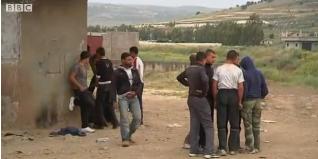Why Lebanon Worries about Unrest in Syria
Syrian refugees (BBC video)
Syrian towns again saw protesters take to the streets in mass protests on Wednesday. They called for unity and the downfall of the regime.
The protests came as European countries pushed for United Nations sanctions aimed at halting Syria’s brutal crackdown on protesters. The rallies came as protesters planned for more demonstrations Friday.
The protests have now been occurring for two months, with human rights groups estimating at least 1,000 people have died at the hands of security forces. As the violent crackdown, and largely peaceful protests, continue, Syria’s neighbor, Lebanon, has found it hard not to get wrapped up in the turmoil.
The Syrian capitol Damascus is only 50 miles away from the Lebanese capital of Beirut. And Syria has long held a powerful sway over its smaller neighbor. Syrian troops were here for nearly 30 years until a car bomb killed former Prime Minister Rafiq Hariri in 2005 and popular anger drove the Syrians out.
Syria helps supply Hezbollah with money and arms. And it backs other political parties here that will do its bidding. Now Syrian President Bashar al Assad is facing the biggest challenge to his 11 years of autocratic rule. And Lebanon is feeling the waves.
Lebanese sympathetic to Syrian protesters held a demonstration outside the National Bank in Beirut earlier this week. There were about 50 of them. They held roses for those killed during demonstrations. About two blocks away, some 200 Syrian migrant workers holding posters of Syrian president Assad began to march toward them.
We Will Die for You
The pro-Assad protesters chanted “with our blood and our hearts, we will die for you, Bashar.”
Lebanese soldiers decked out in body armor, helmets and automatic weapons kept the two groups apart. Yasser Saad, a civil engineer, was one of the pro Assad demonstrators.
“We are supporting Bashar al Assad,” Saad said. “Other countries want to take some benefits from those rebellions, so they are supporting them against Basher al Assad. But this is not what Syrians want. They are against the rebellion. As you can see all over this place.”
Saad accuses “foreigners” of instigating anti-Syrian demonstrations. Since those “foreigners” mean the United States and Israel, he’s essentially calling anti-Assad protestors, traitors.
A group called the Lebanese in Solidarity With the Dignity and Freedom of the Syrian People had planned to hold a conference in a nearby hotel last week. Lebanese journalist Manal Nahas had hoped to attend. But the event was canceled.
“They called the hotel and told them we will burn the hotel if you accept these people to gather, to show their support.”
Organizers of the event say 28 other hotels refused their request to hold a conference. Eventually, this week, they found a warehouse in a suburb of Beirut that was willing to host them. It went on without problems.
Indicative of how sensitive the issue of the Syrian turmoil is: many analysts and Lebanese politicians, especially those who are traditionally anti-Syrian, have refused to talk about the issue.
Pro-Syrian parties, like Hezbollah, have been more vocal.
“Lebanon’s commitments towards Syria and our role as a resistance against Israel require us to maintain Syria’s stability,” said Hezbollah leader Hassan Nasrallah in a speech Thursday. “We call on the Syrians to resort to dialogue and discuss reform. We don’t meddle in Syria’s affairs and we oppose agendas against it.”
But Lebanese officials sympathetic to Syria are being accused of meddling.
Army Strengthening Numbers
On the northern Lebanese border with Syria, the Lebanese Army has beefed up its presence. There are two armored troop carriers bristling with men and heavy machine guns. At least 4,000 Syrian refugees have fled to this area.
They say they escaped shelling and attacks by the Syrian army on peaceful protesters. Human Rights Watch said some refugees are being arrested by the Lebanese army and told they’ll be deported to Syria. That’s what happened to three Syrian soldiers who crossed into Lebanon. Lebanese Member of Parliament Moim Rabih said that’s against international law.
“They entered Lebanon, and they were helped by the people here,” Rabih said. “And then the Lebanese army took them and handed them back to the Syrians. I’m not sure if they wanted to go, but we know the army sent them back to Syria.”
If the soldiers were deserters, they could be exposed to torture or worse. Human rights organizations have called for Lebanon to adhere to international law, which calls for those fleeing violence to be given temporary asylum. They say those obligations “cannot be trumped by bilateral security ties between Lebanon and Syria’s security forces.”
The story you just read is accessible and free to all because thousands of listeners and readers contribute to our nonprofit newsroom. We go deep to bring you the human-centered international reporting that you know you can trust. To do this work and to do it well, we rely on the support of our listeners. If you appreciated our coverage this year, if there was a story that made you pause or a song that moved you, would you consider making a gift to sustain our work through 2024 and beyond?
